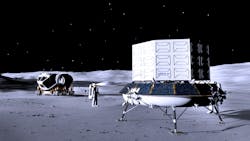ESA selects Airbus for Moon lander study
BREMEN, Germany - Airbus has been selected by the European Space Agency (ESA) as one of the two primes for the definition phase of the European Large Logistic Lander (EL3). In this study (phase A/B1), Airbus will develop the concept of a large multi-role logistic lander able to transport up to 1.7 tons of cargo to any location on the lunar surface. EL3 flights are set to begin in the late 2020s, with a cadence of missions over the following decade and more.
Europe is already contributing to the Global Exploration Roadmap agreed by 14 space agencies around the world, in which Airbus is also playing its part. European participation includes international missions to Mars, substantial elements for crewed space stations – the International Space Station and the Lunar Gateway – and the Orion European Service Module (ESM) which will power Artemis, the next human mission to the lunar surface.
With EL3, ESA and its member states will make a further substantial European contribution to the international effort to establish sustainable exploration of the Moon. EL3 will be designed as a fully independent European lunar surface logistics mission capability, including European launch capability with Ariane 6. ESA anticipates flying three to five EL3 missions over a 10 year time frame.
Based on a generic plug-and-play landing element, the EL3 could support a range of lunar activities including: logistics support for crewed missions on the Moon (Artemis base camp), scientific missions with rovers and static payloads, or a sample return mission.
To achieve sustained human presence on the Moon, considerable logistical infrastructure will be needed – whether testing critical technologies or prospecting for lunar resources, starting in-situ production and storage of products like propellant, drinking water or oxygen, or even creating a long term settlement.
EL3, launched on an Ariane 64 from Kourou as a single payload of up to 8.5 tons, can be put on a direct trajectory to the Moon, similar to the trajectory flown by Apollo 50 years ago.
The study will be led by the lunar exploration team in Bremen, Airbus’ hub for space exploration activities and will involve more than 20 engineers from five Airbus sites in Germany, France, and the UK. Airbus will be working with six companies and one research institute from seven different countries across Europe.
